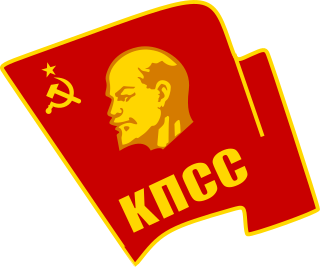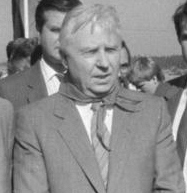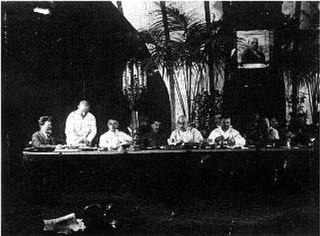Related Research Articles

The Communist Party of the Soviet Union (CPSU), at some points known as the Russian Communist Party (Bolsheviks), All-Union Communist Party (Bolsheviks) and Bolshevik Party, and sometimes referred to as the Soviet Communist Party (SCP), was the founding and ruling political party of the Soviet Union. The CPSU was the sole governing party of the Soviet Union until 1990 when the Congress of People's Deputies modified Article 6 of the 1977 Soviet Constitution, which had previously granted the CPSU a monopoly over the political system. The party's main ideology was Marxism-Leninism.

Yegor Kuzmich Ligachyov was a Soviet and Russian politician who was a high-ranking official in the Communist Party of the Soviet Union (CPSU), and who continued an active political career in post-Soviet Russia. Originally an ally of Mikhail Gorbachev, Ligachyov became a challenger to his leadership.

The Presidium of the 22nd Congress of the Communist Party of the Soviet Union (CPSU) was in session from 1961 to 1966. CPSU First Secretary Nikita Khrushchev chaired the Presidium from 1961 to 1964; Leonid Brezhnev succeeded him that year and chaired it until 1966. In contrast to full members, candidate members of the Presidium could not vote during Presidium sessions. It was normal that a full member of the Presidium had previously served as a candidate member, but this was not always the case. During the term 23 people held seats in the Presidium: 14 full members and 9 candidate members. One candidate member was promoted to full membership in the Presidium during the term. Not a single Presidium member died during this period while retaining office.
The Politburo of the 28th Congress of the Communist Party of the Soviet Union was in session from 1990 to 1991.
The Politburo of the 23rd Congress of the Communist Party of the Soviet Union was in session from 1966 to 1971.
The Central Committee (CC) composition was elected by the 8th Congress, and sat from 23 March 1919 until 5 April 1920. The CC 1st Plenary Session renewed the composition of the Politburo, Secretariat and the Organizational Bureau (OB) of the Russian Communist Party (Bolsheviks).

The Central Committee (CC) composition was elected by the 9th Congress, and sat from 5 April 1920 until 16 March 1921. The CC 1st Plenary Session renewed the composition of the Politburo, Secretariat and the Organizational Bureau (OB) of the Russian Communist Party (Bolsheviks).

The Central Committee (CC) composition was elected by the 10th Congress, and sat from 16 March 1921 until 2 April 1922. The CC 1st Plenary Session renewed the composition of the Politburo, Secretariat and the Organizational Bureau (OB) of the Russian Communist Party (Bolsheviks).

The Central Committee (CC) composition was elected by the 11th Congress, and sat from 2 April 1922 until 25 April 1923 . The CC 1st Plenary Session renewed the composition of the Politburo, Secretariat and the Organizational Bureau (OB) of the Russian Communist Party (Bolsheviks).

The Central Committee (CC) composition was elected by the 12th Congress, and sat from 25 April 1923 until 31 May 1924. The CC 1st Plenary Session renewed the composition of the Politburo, Secretariat and the Organizational Bureau (OB) of the Russian Communist Party (Bolsheviks).

The Central Committee (CC) composition was elected by the 13th Congress, and sat from 2 June 1924 until 31 December 1925. The CC 1st Plenary Session renewed the composition of the Politburo, Secretariat and the Organizational Bureau (OB) of the All-Union Communist Party (Bolsheviks).
The Central Committee (CC) composition was elected by the 14th Congress, and sat from 31 December 1925 until 19 December 1927. The CC 1st Plenary Session renewed the composition of the Politburo, Secretariat and the Organizational Bureau (OB) of the All-Union Communist Party (Bolsheviks).

The Central Committee (CC) composition was elected by the 15th Congress, and sat from 19 December 1927 until 13 July 1930. The CC 1st Plenary Session renewed the composition of the Politburo, Secretariat and the Organizational Bureau (OB) of the All-Union Communist Party (Bolsheviks).
The Central Committee (CC) composition was elected by the 16th Congress, and sat from 13 July 1930 until 10 February 1934. Its 1st Plenary Session elected the Politburo, Secretariat and Orgburo. The 16th Congress was the first party convention since the 13th Congress which saw no organized opposition, and the first congress in party history in which there was no opposition to the party leadership. Ukrainian historian Oleg Khlevniuk considers the period 1930–1934 to be a "transitional period" between collective leadership (referred to interchangeably by him as oligarchy) and Joseph Stalin's personal dictatorship (autocracy). The removal of Alexei Rykov, the Chairman of the Council of People's Commissars (SNK, the Soviet government), from the Politburo at the 1st Joint Plenary Session of the CC and the Central Control Commission (CCC) has been marked in historic literature as "the definitive Stalinization of that body [Politburo]" according to Khlevniuk.

The Central Committee of the 17th Congress of the All-Union Communist Party (Bolsheviks) sat from 10 February 1934 until the convening of the 18th Congress on 10 March 1939. Its 1st Plenary Session elected the Politburo, Secretariat and Orgburo. The 17th Congress was labelled the "Congress of Victors" to mark the success of the first five-year plan and the collectivization of agriculture. The CC 1st Plenary Session elected Joseph Stalin General Secretary of the Central Committee, and Lazar Kaganovich continued to serve as Stalin's deputy, an informal post referred to by Sovietologists as Second Secretary, and was empowered to manage party business and sign Politburo resolutions when Stalin was away from Moscow.
The Central Committee of the 23rd Congress of the Communist Party of the Soviet Union was in session from 1966 until 1971. There were 195 regular members chosen, an increase from the 175 selected in 1961; of the 195 members, 51 were newcomers, and 144 were incumbents; another 31 had died or resigned since the 1961 election. Another 145 candidate members, who could participate but could not vote on motions, were picked in addition to the voting regular members.
The Central Committee of the 25th Congress of the Communist Party of the Soviet Union was in session from 1976 until 1981. It elected, at its 1st Plenary Session, the 25th Politburo, the 25th Secretariat and the 25th Party Control Committee of the Communist Party of the Soviet Union.
The Central Committee of the 26th Congress of the Communist Party of the Soviet Union was in session from 1981 until 1986. It elected, at its 1st Plenary Session, the 26th Politburo, the 26th Secretariat and the 26th Party Control Committee of the Communist Party of the Soviet Union.
The Central Committee of the 28th Congress of the Communist Party of the Soviet Union (CPSU) was in session from 1990 until the party was banned on 6 November 1991. It elected, at its 1st Plenary Session, the Politburo and the Secretariat (and individual secretaries) of the 28th term.
This Central Committee of the 5th Congress of the Russian Social Democratic Labour Party was in session from 19 May 1907 until 17 January 1912.
References
Citations
- ↑ "XXVII-й съезд Коммунистической партии Советского Союза 25.2 - 6.3.1986" (in Russian). Справочник по истории Коммунистической партии и Советского Союза 1898 - 1991. Retrieved 26 October 2014.
- ↑ Central Intelligence Agency 1986, p. iii.
- 1 2 3 4 5 Central Intelligence Agency 1986, p. 6.
- 1 2 3 4 5 Central Intelligence Agency 1986, p. 5.
- 1 2 Central Intelligence Agency 1986, pp. 2–3.
- 1 2 3 Gill 1994, p. 17.
- 1 2 Central Intelligence Agency 1986, pp. 6–7.
- ↑ Gill 1994, p. 24.
- ↑ Central Intelligence Agency 1986, p. 7.
- ↑ Gill 1994, p. 19.
- ↑ Gill 1994, pp. 19–21.
- ↑ Gill 1994, p. 27.
- 1 2 3 Gill 1994, p. 21.
- 1 2 3 4 5 6 Gill 1994, p. 22.
- ↑ Gill 1994, pp. 22–23.
- 1 2 Gill 1994, p. 23.
- 1 2 3 Gill 1994, p. 28.
- ↑ Gill 1994, p. 29.
- 1 2 3 Gill 1994, p. 32.
- ↑ Gill 1994, p. 33.
- ↑ Gill 1994, pp. 33–36.
- ↑ Hough 1997, p. 318.
- 1 2 Hough 1997, p. 319.
- ↑ Hough 1997, p. 320.
- 1 2 3 Gill 1994, p. 37.
- ↑ Gill 1994, p. 38.
- ↑ Gill 1994, p. 30.
- 1 2 3 4 Brown 1997, p. 168.
- ↑ Hough 1997, p. 326.
- 1 2 3 Hough 1997, p. 321.
- ↑ Hough 1997, p. 322.
- 1 2 3 Hough 1997, p. 324.
- ↑ Hough 1997, pp. 324–325.
- 1 2 3 Hough 1997, p. 325.
- 1 2 Garthoff 2000, p. 347.
- 1 2 3 Garthoff 2000, p. 348.
- 1 2 3 4 5 6 7 Brown 1997, p. 172.
- 1 2 3 4 5 6 7 8 Brown 1997, p. 173.
- 1 2 3 4 5 6 Brown 1997, p. 174.
- ↑ Simons & White 1984, pp. 423–425.
- ↑ "Съезды, конференции, пленумы и заседания РСДРП - РСДРП(б) - РКП(б) - ВКП(б) - КПСС" [Congresses, conferences, plenums and meetings of the RSDLP - RSDLP(b) - RCP(b) - CPSU]. Knowbysight.info. Archived from the original on 8 April 2022. Retrieved 16 April 2022.
- 1 2 "Центральный Комитет, избранный XXVI съездом КПСС 3.3.1981, члены" [Central Committee elected by the XXVI Congress of the CPSU 3.3.1981, members]. Knowbysight.info. Archived from the original on 25 April 2022. Retrieved 21 May 2022.
- 1 2 "Центральный Комитет, избранный XXVII съездом КПСС 6.3.1986, члены" [Central Committee elected by the XXVII Congress of the CPSU 6.3.1986, members]. Knowbysight.info. Archived from the original on 16 April 2022. Retrieved 21 May 2022.
- 1 2 "Центральный Комитет, избранный XXVIII съездом КПСС 13.7.1990, члены" [Central Committee elected by the XXVIII Congress of the CPSU 13.7.1990, members]. Knowbysight.info. Archived from the original on 17 May 2022. Retrieved 21 May 2022.
- 1 2 "Персональный состав Центрального комитета РСДРП - РСДРП(б) - РКП(б) - ВКП(б) - КПСС" [Composition of the Central Committee of the RSDLP - RSDLP(b) - RCP(b) - VKP(b) - CPSU]. Knowbysight.info. Archived from the original on 31 March 2022. Retrieved 16 April 2022.
Bibliography
- Central Intelligence Agency (April 1986). "The 27th CPSU Congress: Gorbachev's Unfinished Business" (PDF). Directorate of Intelligence of the Central Intelligence Agency (CIA).
- Brown, Archie (1997). The Gorbachev Factor . Oxford University Press. ISBN 0192880527.
- Garthoff, Raymond (2000). The Great Transition: American–Soviet Relations and the End of the Cold War . Brookings Institution Press. ISBN 0815730608.
- Gill, Graeme (1994). The Collapse of a Single-Party System: The Disintegration of the Communist Party of the Soviet Union . Cambridge University Press. ISBN 0521469430.
- Hough, Jerry (1997). Democratization and Revolution in the USSR, 1985–91. Brookings Institution Press. ISBN 0815737491.
- Simons, Williams; White, Stephens, eds. (1984). "Chapter 3: Statute of the Communist Party of the Soviet Union". The Party Statutes of the Communist World. Law in Eastern Europe. Brill Publishers. pp. 413–435. ISBN 9024729750.